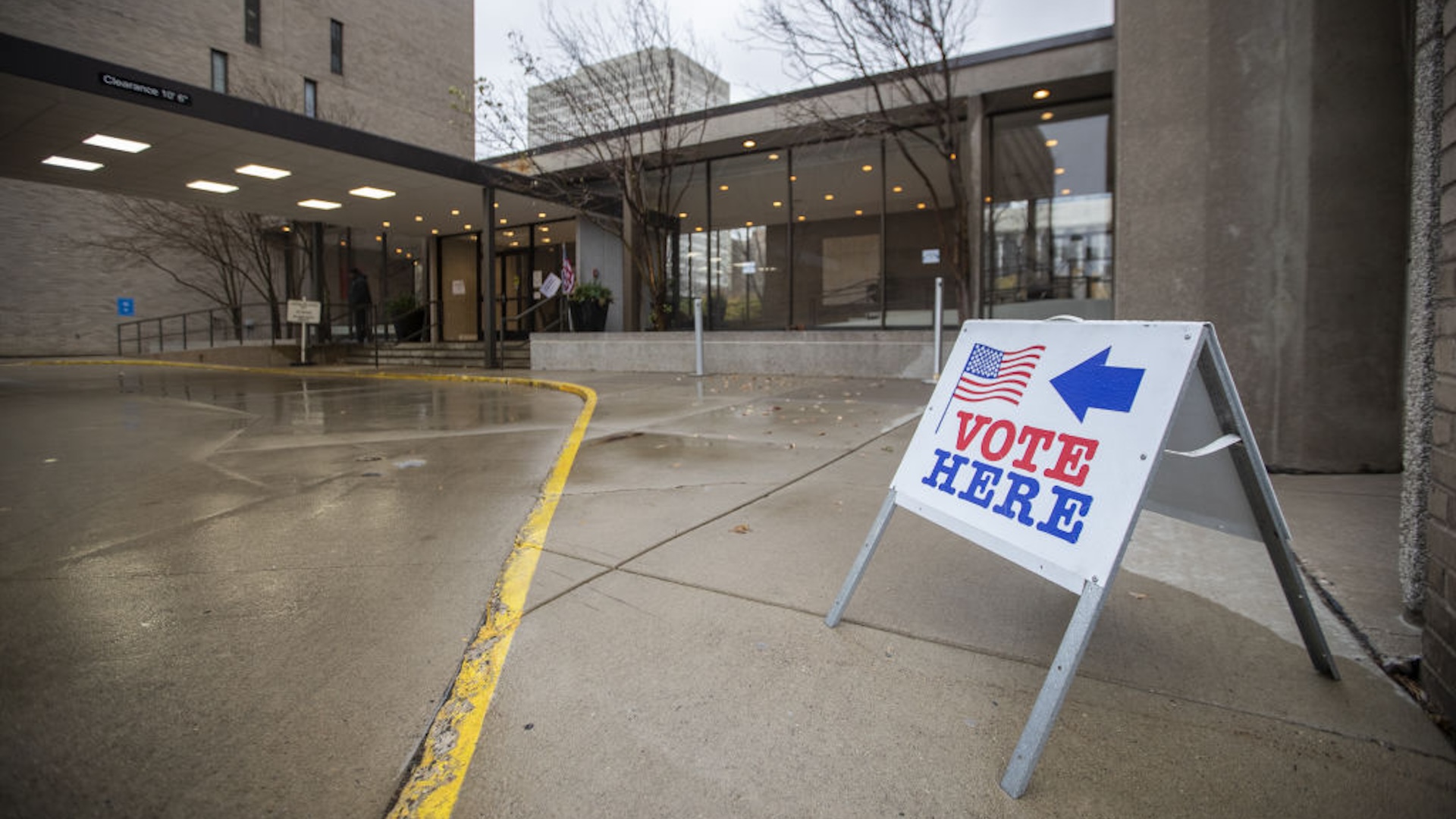I went for a run on Election Day. The streets near my neighborhood, normally clogged with cars dropping off children at an elementary school down the road, were mostly empty. Public schools were closed, and the same yard signs I’d been walking and driving past for the last several months—Trump/Vance, Harris/Walz—seemed, ironically, beside the point. In a country where the lead-up to a presidential election is excruciatingly drawn out, where, in this specific case, an incumbent head of state more closely resembling a corpse threatened to run for office again before bowing out at the last second, throwing the entire race into disarray, the eventual arrival of the day itself was lackluster. I drove to work, where I overheard murmurs from customers about how they voted, the increased police presence, the lines at the polls, how dramatic they felt they were acting. The local ACLU chapter sent volunteers to various voting locations to document any illegal activity. The National Guard was on standby. Cleaning the bathrooms, I found an “I Voted” sticker plastered to the side of one of the toilets. Then, when I got home, I tried my best not to follow the initial voting results.
The attitude of the American electorate generally hovers between nihilism and sentimentality, and both tenors vacillated wildly in prominence on the Democratic side throughout the night. As things looked promising, then bleak for Kamala Harris, a familiar feeling set in—that what one does individually has little to no effect, that one’s participation is, if not futile, negligible. It’s easy to look ahead during elections like this one, treating them as a referendum on how the hypothetical masses of the future will look back on this moment, whether as a concerted press against fascism or a capitulation to the most bigoted, small-minded impulses of this country’s fear-motivated populace. All this to say, I couldn’t stop myself from checking the polls feverishly, just a little bit, if only to go to bed with a sense of whose triumphant name I’d be waking up to. One friend remarked that despite his single term, it had felt like we had already had two Donald Trump presidencies, that he was inescapable no matter where you went. The following morning, after idly looking at Twitter and hearing various squawks from various polls, I walked back out onto the street near the elementary school and found things went on as they usually did—kids running down the sidewalk, parents running after them in panicked waddles, elderly crossing guards looking sleepy.
This seeming normalcy is maddening given what has just been decided. American politics, for the everyday citizen, is a matter of distanced, often meaningless participation, at least when it comes to the presidency. If you live in a swing state, like I do, you are bombarded with reminders of your civic superiority. Texts, flyers, canvassers, billboards, emails, calls, strange men dancing at stoplights with handmade signs. Your vote literally means more, which makes it all the more consequential if, like me, you tarried on the possibility of casting a protest vote against Kamala Harris. Disaffection with the government, with politicians, with major corporations and lobbying groups, forces people to speak in vagaries, to make reference to monoliths that, while cliched for their ubiquity and their influence, are nonetheless constant players in the game.
This year, the ever-escalating horror of the war in Gaza, aided, abetted, armed, and funded by an American government led by a Democrat president, was a hard line many lifelong Democrats were unwilling to cross. While Trump’s prerogative has always been to let Israel do whatever it deems necessary in Gaza, Joe Biden and Harris’s continuation of the vaunted “bear hug” as tens of thousands of Palestinians are actively being killed left a sizable chunk of the electorate stranded. Before the night was out, and Michigan’s final tally leaned toward Trump, it was clear that Harris had lost the south side of Dearborn, a majority Muslim community that overwhelmingly voted for Biden in 2020.
Much was made about whether or not the moral quandary of voting in relation to Gaza would tip the scales in Trump’s favor. Lilly Greenberg Call and Harrison Mann, two former federal workers who resigned from their positions in the Department of the Interior and the Defense Intelligence agency, wrote in the labor magazine In These Times that their aspirations for the Democrats to be the moral leaders in this situation were dashed. “We hoped this election would become a referendum on Gaza,” Call and Mann wrote. “For us, that hope was premised on the assumption that President Joe Biden, or at least Harris, would reconsider their position on Israel if it looked like it would cost the election, either by alienating voters or instigating a larger war. We were wrong.”
Here in Nevada, unions loyal to the Democratic Party shifted their focus on issues closer to home. The Culinary Union, which, in tandem with their parent union UNITE HERE called for a ceasefire in mid-March, volunteered its members as part of a widespread canvassing effort that the Democratic Party has historically relied on to promote voter turnout. The focus close to and on Election Day was turned toward everyday material issues: grocery and gas prices, rent, taxes, and legislation affecting marginalized groups, many of whom make up a sizable portion of the Culinary Union. Inevitably, what the Democrats wished to persuade Nevadans of was that they had their best interests in mind, that what this election was really about was the United States as a country which took care of its own before all others.
This narrow, myopic view, which the Democrats hoped would engender favor with both liberals and Never Trumpers who still believe in the essential goodness of the American project, did not work. Harris and her campaign partners, including an ill-advised appearance by a scolding Bill Clinton, made it abundantly clear that the Democratic Party stands for values at home that it does not stand for internationally. Was this the end-all, be-all? Presidential election cycles often feel that way. But maybe this time around, things will be different.
I don’t mean to say that because Trump is due to be sworn in in January, he will deliver on the many promises he made, reneged on, then made again in slightly altered form. Many leftists voted for Kamala Harris because they believed that she was a movable figure who, if pushed by collective action and popular opinion, would end the war in Gaza, work to decouple the interests of Wall Street and Silicon Valley in American politics, and abandon her hawkish border and policing policy proposals. Many center-right conservatives voted for Donald Trump because they were scared, or, more likely, because they were motivated by vindictiveness towards the Other, by the promise of a government unafraid of a “Christian” nationalism that promotes “family values” and the sanctity of life.
Trump and Harris are strikingly different, but maybe now that Trump has won yet again, it might finally be time that we decouple our understanding of civic duty from the four-year election cycle, that we stop hanging our hopes and fears on a minimum demonstration of political action in a two-party system in which neither side has, for the last several cycles, really presented the citizenry the true freedom of choice. Voting’s centrality in the American psyche is misguided. This is always made abundantly clear the day after Election Day. That life goes on (seemingly) much like it did before isn’t evidence that nothing matters and that everything is always going to be OK or always going to be horrible, but that our focus is far too blinkered, our priorities, at least at the level of national discourse, far too selfish. One of the United States’ most pernicious myths is the idea that it is somehow separate from and above the rest of the world. There is a moral duty we shirk if we buy into this myth, if we fail to understand that the world’s concerns are our concerns because we live in the world, not as Americans but as people.
That we spend so much time attempting to scry our collective national future based on the Presidency represents a broken political and moral imagination. I know there are many for whom this royal “we” isn’t applicable, many for whom the limitations of action at the federal level have never been an obstacle towards meaningful work. More of us might take that mindset to heart. It’s never been enough to be vocal, especially in a country that so highly favors freedom of speech while, say, actively suppressing the speech of those who are unashamed to boldly state their solidarity with Palestine.
How to take, for example, Senate Majority Leader Chuck Schumer’s recent pledge to pass a bill that, in direct response to the campus protests in solidarity with Gaza, broadens the definition of antisemitism in relation to anti-discrimination laws? How to take the increasingly snide and racist comments of White House spokesperson Matthew Miller, whose responses to reporters’ questions about U.S. foreign policy in Israel have been, at best, dismissive? Domestically, as just one of dozens of examples, how to account for the near total media and legislative silence with regards to the Supreme Court’s recent ruling allowing municipalities to criminalize sleeping outside?
These concerns will endure no matter which party controls the Senate, no matter which candidate is in office. Let me be clear: They are compounded in urgency and number under another Trump presidency. To that end, we are either as sanctified or as doomed as our self-pity allows. I suspect that blaming Harris and Biden will provide some comfort to those who feel that this was their election to lose. I don’t necessarily disagree and I certainly don’t think the Democratic Party should ever be allowed to forget how their at-times avoidant, at-times stridently arrogant stance on an unfolding genocide lost them a key swing state and the goodwill of millions of Americans. But if there was ever a time to break our foxhole trust and reliance on voting as the ultimate political action, it’s now. If there was ever a time to expect more from each other ethically and morally, it’s now.
Lately, I’ve been turning to leftist Christian thinkers who, living during Vietnam, World War II, and the Gulf War, took the temperature of the United States and found it running a concerning fever. I’ve been struck by the universality of their assessments, which remain true whether or not the reader is religious. William Stringfellow, a theologian and activist, wrote in his 1973 polemic An Ethic for Christians & Other Aliens in a Strange Land:
On obvious, ominous urgent fronts, society in America is right now desperately beleaguered by war and the entrenched commerce of war, by ecological corruption and the population problem, by profound racism and urban chaos, by technology and unemployability, by inflation and taxation. And all of these issues are compounded by unaccountability, secrecy, and practiced deception in government, by manifold threats to established authority and intimidating official abuse of the rule of law, by vested intransigence to significant change and primary recourse to violence by agents of conformity and advocates of repression as well as some few professed revolutionaries.
Over 50 years later, Stringfellow’s assessment sounds not just relevant, but urgent. Despite his potent observations, he strays from despair. Crucial to his argument is the lack of a practical solution; that’s left to the reader. Maybe that notion is difficult to take at the current moment. But what he points to—the rot at the core of an American society that spectates its own destruction—is exactly what allows this same cycle of repression and stagnation to continue again and again. What is left, except for us to turn toward each other as the means of our collective betterment? What is left after our hopes are dashed? What kind of losers will we be? Hopefully the kind that endure.






